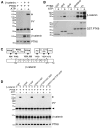Identification of beta-catenin as a target of the intracellular tyrosine kinase PTK6
- PMID: 20026641
- PMCID: PMC2954247
- DOI: 10.1242/jcs.053264
Identification of beta-catenin as a target of the intracellular tyrosine kinase PTK6
Abstract
Disruption of the gene encoding protein tyrosine kinase 6 (PTK6) leads to increased growth, impaired enterocyte differentiation and higher levels of nuclear beta-catenin in the mouse small intestine. Here, we demonstrate that PTK6 associates with nuclear and cytoplasmic beta-catenin and inhibits beta-catenin- and T-cell factor (TCF)-mediated transcription. PTK6 directly phosphorylates beta-catenin on Tyr64, Tyr142, Tyr331 and/or Tyr333, with the predominant site being Tyr64. However, mutation of these sites does not abrogate the ability of PTK6 to inhibit beta-catenin transcriptional activity. Outcomes of PTK6-mediated regulation appear to be dependent on its intracellular localization. In the SW620 colorectal adenocarcinoma cell line, nuclear-targeted PTK6 negatively regulates endogenous beta-catenin/TCF transcriptional activity, whereas membrane-targeted PTK6 enhances beta-catenin/TCF regulated transcription. Levels of TCF4 and the transcriptional co-repressor TLE/Groucho increase in SW620 cells expressing nuclear-targeted PTK6. Knockdown of PTK6 in SW620 cells leads to increased beta-catenin/TCF transcriptional activity and increased expression of beta-catenin/TCF target genes Myc and Survivin. Ptk6-null BAT-GAL mice, containing a beta-catenin-activated LacZ reporter transgene, have increased levels of beta-galactosidase expression in the gastrointestinal tract. The ability of PTK6 to negatively regulate beta-catenin/TCF transcription by modulating levels of TCF4 and TLE/Groucho could contribute to its growth-inhibitory activities in vivo.
Figures







References
-
- Andreu P., Colnot S., Godard C., Gad S., Chafey P., Niwa-Kawakita M., Laurent-Puig P., Kahn A., Robine S., Perret C., et al. (2005). Crypt-restricted proliferation and commitment to the Paneth cell lineage following Apc loss in the mouse intestine. Development 132, 1443-1451 - PubMed
-
- Batlle E., Henderson J. T., Beghtel H., van den Born M. M., Sancho E., Huls G., Meeldijk J., Robertson J., van de Wetering M., Pawson T., et al. (2002). Beta-catenin and TCF mediate cell positioning in the intestinal epithelium by controlling the expression of EphB/ephrinB. Cell 111, 251-263 - PubMed
-
- Behrens J., Vakaet L., Friis R., Winterhager E., Van Roy F., Mareel M. M., Birchmeier W. (1993). Loss of epithelial differentiation and gain of invasiveness correlates with tyrosine phosphorylation of the E-cadherin/beta-catenin complex in cells transformed with a temperature-sensitive v-SRC gene. J. Cell Biol. 120, 757-766 - PMC - PubMed
Publication types
MeSH terms
Substances
Grants and funding
LinkOut - more resources
Full Text Sources
Other Literature Sources
Molecular Biology Databases
Research Materials

